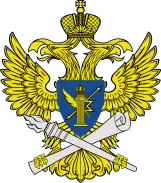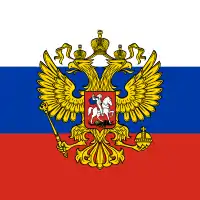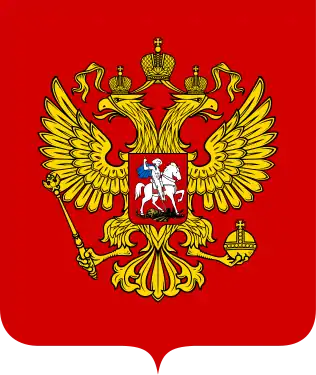Federal Service for Supervision of Communications, Information Technology and Mass Media
The Federal Service for Supervision of Communications, Information Technology and Mass Media (Russian: Федеральная служба по надзору в сфере связи, информационных технологий и массовых коммуникаций)[2] or Roskomnadzor (Russian: Роскомнадзор) is the Russian federal executive body responsible for censorship in media and telecommunications. Its areas include electronic media, mass communications, information technology and telecommunications; overseeing compliance with the law protecting the confidentiality of personal data being processed; and organizing the work of the radio-frequency service.
| Федеральная служба по надзору в сфере связи, информационных технологий и массовых коммуникаций | |
 | |
| Agency overview | |
|---|---|
| Jurisdiction | Russia |
| Headquarters | Kitaygorodsky pas., 7/2 Kitay-gorod Moscow |
| Employees | 3,019 (2017) |
| Annual budget | 8.5 billion rubles (2016) |
| Agency executive |
|
| Parent agency | Ministry of Digital Development, Communications and Mass Media |
| Website | rkn |
History
This Federal Service for Supervision in the Sphere of Telecom, Information Technologies and Mass Communications was re-established in May 2008. Resolution number 419, "On Federal Service for Supervision in the Sphere of Telecom, Information Technologies and Mass Communications", was adopted on February 6, 2008.[3][4]
In March 2007 the authority—then a subdivision of the Cultural Ministry of Russia called Russian Federal Surveillance Service for Compliance with the Legislation in Mass Media and Cultural Heritage Protection (Rosokhrankultura)—warned the Kommersant newspaper that it shouldn't mention National Bolshevik Party on its pages, as the party had been denied official registration.[5]
In 2019 media criticized the service's choice of experts who are performing analysis of referred publications to assess their compliance with regulations. A number of experts recruited by Roscomnadzor are associated with pseudo-scientific and sectarian movements, including HIV-deniers, ultra-conservative, anti-vaccination and alternative "medicine" activists. Three of such experts—Anna Volkova, Tatyana Simonova and Elena Shabalina—assessed lyrics of popular rapper Egor Kreed in which they found "mutagenic effect", "satanic influence" and "psychological warfare".[6]
Also in 2019 Roscomnadzor published the first iteration of the "list of information resources who had in the past been spreading unreliable information" including a number of social media groups and media websites accused mostly of incorrectly reporting on a single incident in Dzerzhinsk in June 2019.[7][8]
After the nationwide January 2021 street protests, the agency fined seven social media companies for not removing pro-Navalny videos. “Facebook, Instagram, Twitter, TikTok, VKontakte, Odnoklassniki and YouTube will be fined for non-compliance with requirements to prevent the dissemination of calls to minors to participate in unauthorized rallies,” Roskomnadzor said in a statement published on its website.[9][10]
Service tasks
Roskomnadzor is a federal executive body responsible for control, censorship, and supervision in the field of media, including electronic media and mass communications, information technology and communications functions control and supervision over the compliance of personal data processing requirements of the legislation of the Russian Federation in the field of personal data, and the role of co-ordinating the activities of radio frequency service. It's an authorized federal executive body for the protection of human subjects of personal data.[11] It is also the body administering Russian Internet censorship filters.[12]
Blacklisted websites
On April 5, 2013, it was confirmed by a spokesperson for Roskomnadzor that Wikipedia had been blacklisted over the article 'Cannabis smoking' (Курение каннабиса) on Russian Wikipedia.[13][14] On March 31, 2013 The New York Times reported that Russia was beginning 'Selectively Blocking [the] Internet'.[15] In 2014, during the Crimea Crisis, Roskomnadzor had a number of websites criticising Russian policy in Ukraine blocked, including the blog of Alexei Navalny, Kasparov.ru and Грани.ру.[16] Also, on June 22, 2016 Amazon Web Services was entirely blocked for a couple of hours because of a poker app.[17][18]
GitHub
In October 2014 GitHub was blocked for a short time. On December 2 GitHub was blocked again for some satiric notes, describing "methods of suicide",[19] which caused major tensions among Russian software developers. It was unblocked on December 4, and GitHub had set up a special page[20] dedicated to Roskomnadzor-related issues. All content was and remains available for non-Russian networks.
Russian Wikipedia
On August 18, 2015, an article in Russian Wikipedia about charas (Чарас (наркотическое вещество)) (in Russian) was blacklisted by Roskomnadzor as containing propaganda on narcotics. The article was then rewritten from scratch using UN materials and textbooks, but on August 24 it was included in the list of forbidden materials, sent to Internet providers of Russia. As Wikipedia uses HTTPS protocol to encrypt traffic, effectively all of the site with all language versions of Wikipedia was blocked in Russia on the night of August 25.[21]
Adult content
In September 2016, adult websites Pornhub and YouPorn were blocked by Roskomnadzor as containing adult pornographic content.[22] The watchdog says that they are not in the market and the demography is not a commodity.[23]
The Daily Stormer
In 2017, the neo-Nazi website The Daily Stormer was briefly moved to a Russian domain, but Roskomnazdor subsequently acted to remove its access, and the site was subsequently moved to the dark web.[24]
Telegram
On April 16, 2018, Russia's federal censor ordered Russian ISPs to start blocking access to the instant messenger Telegram because of "alleged terrorism concerns" as Pavel Durov had refused to grant backdoor privileges to Russian authorities.[25] Soon, the government censor also banned millions of IP addresses belonging to Amazon and Google.[26][25][27]
See also
- Censorship in Russia
- Federal Agency on Press and Mass Communications of the Russian Federation (Rospechat)
- Information privacy
- Internet censorship in Russia
References
- "Руководитель Роскомнадзора Андрей Юрьевич Липов". Роскомнадзор. Retrieved 2020-12-28.
- translation, word by word : "Federal service by Supervision in sphere mass communications and connection"
- "Current structure of the Government of Russia" (in Russian). Government of Russia. Archived from the original on April 29, 2009. Retrieved May 15, 2009.
- "УКАЗ Президента РФ от 12.05.2008 N 724 "Вопросы системы и структуры федеральных органов исполнительной власти"" Archived 2012-05-07 at the Wayback Machine, p. 2
- "Ъ-Газета - И звать их никак". Retrieved 29 August 2015.
- "Познакомьтесь с людьми, которые решают, какие произведения искусства вредны для ваших детей Как экспертами Роскомнадзора становятся сторонники движений, связанных с сектами и лженаукой". meduza.io. Retrieved 2019-12-06.
- "How does Russia fight fake news?". European Audiovisual Observatory. Retrieved 2019-12-06.
- "Перечень информационных ресурсов, регулярно распространяющих недостоверную информацию". Роскомнадзор. Retrieved 2019-12-06.
- "Социальные сети будут привлечены к ответственности за вовлечение подростков в противоправную деятельность". Роскомнадзор. Retrieved 2021-01-27.
- ISACHENKOV, VLADIMIR (29 January 2021). "Moscow court puts several allies of Kremlin critic Alexey Navalny under house arrest". The Globe and Mail Inc. The Associated Press.
- "Постановление от 16 марта 2009 г. №228 О Федеральной службе по надзору в сфере связи, информационных технологий и массовых коммуникаций". Archived from the original on April 7, 2013. Retrieved April 9, 2013.
- "This is how Russian Internet censorship works A journey into the belly of the beast that is the Kremlin's media watchdog". Meduza. 13 August 2015. Retrieved April 17, 2018.
- Sputnik (5 April 2013). "Russia May Block Wikipedia Access Over Narcotics Article". Retrieved 29 August 2015.
- RBTH, Interfax (2013-04-05). "Russian media regulator confirms Wikipedia blacklisted | Russia Beyond the Headlines". Rbth.ru. Retrieved 2016-01-01.
- "Russians Selectively Blocking Internet". The New York Times. Retrieved 2016-01-01.
- "Нас блокируют. Что делать?". Grani.ru. 2014.
- Eurasiatx (2016-06-22). "Russia blocks Amazon Web Services". Retrieved 2016-06-23.
- The Moscow Times (2016-06-23). "Russian Media Watchdog Unblocks Amazon Storage Service Website". Retrieved 2016-06-23.
- Ingrid Lunden. "To Get Off Russia's Blacklist, GitHub Has Blocked Access To Pages That Highlight Suicide". TechCrunch. AOL. Retrieved 29 August 2015.
- "github/roskomnadzor". GitHub. Retrieved 29 August 2015.
- "Kremlin moves to ban Russian Wikipedia". Financial Times. Retrieved 29 August 2015.
- "Russia Has Just Blocked Access To PornHub And YouPorn | TheLADbible". Retrieved 2016-09-15.
- "Роскомнадзор on Twitter". Retrieved 2016-09-15.
- "Daily Stormer: Cloudflare drops neo-Nazi site". BBC News. 27 August 2017.
- Roth, Andrew (17 April 2018). "Russia blocks millions of IP addresses in battle against Telegram app". The Guardian. Guardian News & Media.
- "Russia's federal censor blocks millions of IP addresses in crackdown on Telegram, disrupting Internet services across the country". Meduza. 17 April 2018.
- Evdokimov, Leonid (29 December 2018). "Russia vs. Telegram: technical notes on the battle". Chaos Communication Congress.
Further reading
External links
- Official website (in English)
- Official website
 (in Russian)
(in Russian)

